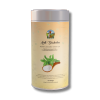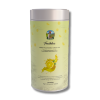

The Ultimate Guide to Lowering Uric Acid Levels Naturally and Preventing Gout Flare-Ups
What Causes High Uric Acid Levels?
Uric acid is a waste product that is produced when the body breaks down purines, which are chemical substances found in the body’s cells and some foods. Normally, uric acid dissolves in the blood, passes through the kidneys, and leaves the body in the urine.
However, sometimes the body produces too much uric acid or the kidneys do not excrete enough of it. This can lead to a condition called hyperuricemia, which means having too much uric acid in the blood.
Hyperuricemia can be caused by several factors, such as:
- Genetics or family history: Some people inherit a tendency to produce more uric acid or have reduced kidney function.
- Diet: Eating foods that are high in purines, such as red meat, organ meats, seafood, beer, and whiskey, can increase uric acid levels. Similarly, consuming foods and drinks that are high in fructose, such as sodas and processed foods, can also raise uric acid levels.
- Medications: Some drugs, such as diuretics (water pills), aspirin, niacin (vitamin B3), and some immunosuppressants, can interfere with the elimination of uric acid or increase its production.
- Health conditions: Certain diseases that cause a rapid turnover of cells, such as blood cancers, psoriasis, and some types of anemia, can increase uric acid levels. Other conditions that affect kidney function or metabolism, such as diabetes, high blood pressure, obesity, and metabolic syndrome, can also contribute to hyperuricemia.
What Are the Symptoms and Diagnosis of Gout?
Gout is one of the most common complications of hyperuricemia. It occurs when excess uric acid forms sharp crystals in the joints and tissues, especially in the big toe. These crystals trigger an inflammatory response that causes sudden and severe pain, swelling, redness, and warmth in the affected area.
Gout attacks usually occur at night or in the early morning and last for several hours or days. They can be triggered by various factors, such as stress, injury, infection, alcohol consumption, dehydration, or eating purine-rich foods.
To diagnose gout, your doctor will ask you about your medical history, symptoms, diet, medications, and family history. They will also examine your affected joint and may order some tests to confirm the diagnosis.
These tests may include:
- Blood test: This measures your uric acid level and other markers of inflammation.
- Joint fluid test: This involves taking a sample of fluid from your affected joint with a needle and examining it under a microscope for uric acid crystals.
- X-ray: This can show if there is any joint damage or other causes of joint pain.
- Ultrasound: This can detect uric acid crystals in soft tissues around the joint.
- Dual-energy CT scan: This can detect uric acid crystals in joints and tissues that are not visible on X-rays or ultrasound.
What Are the Best Foods and Drinks to Lower Uric Acid Levels?
One of the most effective ways to lower your uric acid levels naturally is to follow a healthy diet that is low in purines and fructose. Here are some of the best foods and drinks to include in your diet:
- Water: Drinking plenty of water helps flush out excess uric acid from your body and prevents dehydration. Aim for at least eight glasses of water per day or more if you exercise or sweat a lot.
- Cherries: Cherries are rich in antioxidants and anthocyanins, which have anti-inflammatory and uric acid-lowering effects. You can eat fresh, frozen, or dried cherries or drink cherry juice or extract.
- Dairy products: Low-fat dairy products, such as milk, yogurt, and cheese, are good sources of protein and calcium that can help lower uric acid levels. Choose low-fat or fat-free versions of dairy products and avoid full-fat or high-sugar ones.
- Vegetables: Vegetables are low in purines and high in fiber, vitamins, minerals, and antioxidants that can help lower uric acid levels and inflammation. You can eat most vegetables, such as leafy greens, broccoli, cauliflower, cabbage, carrots, celery, cucumber, zucchini, squash, tomatoes, peppers, mushrooms, and eggplant. However, avoid or limit high-purine vegetables, such as asparagus, spinach, mushrooms, and cauliflower.
- Fruits: Fruits are also low in purines and high in fiber, vitamins, minerals, and antioxidants that can help lower uric acid levels and inflammation. You can eat most fruits, such as apples, bananas, oranges, grapefruits, lemons, limes, berries, grapes, melons, peaches, pears, plums, and pineapple. However, avoid or limit high-fructose fruits, such as applesauce, dried fruits, fruit juices, and honey.
- Whole grains: Whole grains are complex carbohydrates that provide energy and fiber that can help lower uric acid levels and cholesterol. You can eat whole grains, such as oatmeal, brown rice, quinoa, barley, buckwheat, bulgur wheat, and whole-wheat bread and pasta. However, avoid or limit refined grains, such as white rice, white bread, and white pasta, which are low in fiber and can raise blood sugar levels.
- Nuts and seeds: Nuts and seeds are good sources of protein, healthy fats, fiber, and antioxidants that can help lower uric acid levels and inflammation. You can eat nuts and seeds, such as almonds, walnuts, pistachios, cashews, peanuts, sunflower seeds, pumpkin seeds, and flax seeds. However, avoid or limit high-purine nuts and seeds, such as Brazil nuts and sesame seeds.
- Beans and legumes: Beans and legumes are also good sources of protein, fiber, and antioxidants that can help lower uric acid levels and cholesterol. You can eat beans and legumes, such as black beans, kidney beans, pinto beans, chickpeas, lentils, soybeans, tofu, and tempeh. However, avoid or limit high-purine beans and legumes, such as peas and beansprouts.
- Eggs: Eggs are a complete protein source that can help lower uric acid levels and provide essential amino acids. You can eat eggs in moderation, such as one or two per day. However, avoid or limit egg yolks if you have high cholesterol levels.
- Coffee: Coffee is a popular beverage that has been shown to lower uric acid levels and the risk of gout. A study found that drinking four or more cups of coffee per day reduced the risk of gout by 40%. However, avoid or limit caffeinated drinks if you have high blood pressure or anxiety disorders.
What Are the Worst Foods and Drinks to Avoid for Gout?
Some foods and drinks can increase your uric acid levels and trigger gout flare-ups. Here are some of the worst foods and drinks to avoid for gout:
- Alcohol: Alcohol is one of the main culprits of high uric acid levels and gout attacks. Alcohol increases the production of uric acid and reduces its excretion by the kidneys. It also dehydrates the body and causes inflammation. Beer is especially bad for gout because it contains both alcohol and purines. Wine and liquor are also harmful but to a lesser extent. If you drink alcohol, limit your intake to no more than one drink per day for women and two drinks per day for men.
- Red meat: Red meat is a high-purine food that can raise your uric acid levels and the risk of gout. Red meat includes beef, lamb, pork, veal, venison, and organ meats such as liver and kidney. If you eat red meat, limit your portion size to no more than 4 ounces (113 grams) per day.
- Lean Cuts: Choose lean cuts of meat that have less fat and cholesterol, such as sirloin, tenderloin, or round steak. Trim off any visible fat before cooking and use healthy cooking methods, such as grilling, baking, or broiling.
- Processed Meat: Avoid processed meats, such as bacon, ham, sausage, hot dogs, and deli meats, which are high in purines, sodium, and preservatives.
- Seafood: Seafood is another high-purine food that can raise your uric acid levels and the risk of gout. Seafood includes fish, shellfish, shrimp, lobster, crab, oysters, mussels, scallops, and anchovies. If you eat seafood, limit your intake to no more than 6 ounces (170 grams) per week.
- Choose low-purine seafood options, such as salmon, tuna, cod, trout, or herring. These fish are also rich in omega-3 fatty acids, which have anti-inflammatory benefits. Avoid high-purine seafood options, such as sardines, herring, mackerel, anchovies, and caviar.
- Sugary drinks: Sugary drinks are high in fructose, which can increase uric acid levels and the risk of gout. Sugary drinks include sodas, fruit juices, sports drinks, energy drinks, and sweetened teas and coffees. If you drink sugary drinks, avoid or limit them as much as possible. Choose water or unsweetened beverages instead. If you crave something sweet, add a slice of lemon or lime to your water or drink herbal teas with natural sweeteners like honey or stevia.
What Are the Supplements and Herbs That Can Help With Gout?
In addition to following a healthy diet, some supplements and herbs can help lower your uric acid levels and prevent gout flare-ups. However, before taking any supplements or herbs, consult your doctor for the appropriate dosage and possible interactions with your medications. Here are some of the supplements and herbs that can help with gout:
- Vitamin C: Vitamin C is an antioxidant that can help lower uric acid levels and reduce inflammation. A study found that taking 500 mg of vitamin C per day for two months reduced uric acid levels by 10%. You can take vitamin C supplements or eat foods that are rich in vitamin C, such as citrus fruits, strawberries, kiwis, bell peppers, broccoli, and kale.
- Baking soda: Baking soda is a common household ingredient that can help neutralize uric acid and make it easier to excrete by the kidneys. A study found that taking 1/2 teaspoon of baking soda dissolved in water four times a day for two weeks reduced uric acid levels by 8%. However, baking soda can also increase blood pressure and cause stomach upset, so use it with caution and consult your doctor before trying it.
- Apple cider vinegar: Apple cider vinegar is a natural remedy that can help lower uric acid levels and improve kidney function. It also has anti-inflammatory and antibacterial properties that can help with gout symptoms. A study found that taking 2 tablespoons of apple cider vinegar mixed with water twice a day for three months reduced uric acid levels by 10%. You can also add apple cider vinegar to your salads or drinks for extra flavor.
- Turmeric: Turmeric is a spice that has anti-inflammatory and antioxidant effects that can help lower uric acid levels and prevent gout attacks. It contains a compound called curcumin, which inhibits the enzyme that produces uric acid and modulates the immune system’s response to inflammation. A study found that taking 500 mg of curcumin per day for eight weeks reduced uric acid levels by 12%. You can take turmeric supplements or add turmeric powder to your dishes for extra color and flavor.
- Ginger: Ginger is another spice that has anti-inflammatory and antioxidant effects that can help lower uric acid levels and prevent gout attacks. It also has analgesic and antipyretic properties that can help relieve pain and fever associated with gout. A study found that taking 1 gram of ginger extract per day for three months reduced uric acid levels by 10%. You can take ginger supplements or add fresh or dried ginger to your teas or dishes for extra warmth and flavor.
What Are the Lifestyle Changes That Can Prevent Gout Attacks?
Besides following a healthy diet and taking supplements or herbs, some lifestyle changes can also help lower your uric acid levels and prevent gout attacks. Here are some of the lifestyle changes that can prevent gout attacks:
- Lose weight: Being overweight or obese can increase your uric acid levels and the risk of gout. Losing weight can help lower your uric acid levels and reduce the pressure on your joints. However, avoid crash diets or fasting which can cause a sudden drop in calories and increase your uric acid levels. Instead, follow a balanced and gradual weight loss plan that includes exercise and healthy eating.
- Exercise regularly: Exercise can help lower your uric acid levels and prevent gout attacks by improving your blood circulation, kidney function, and metabolism. Exercise can also help you lose weight, reduce stress, and enhance your mood and well-being. Aim for at least 150 minutes of moderate-intensity aerobic exercise or 75 minutes of vigorous-intensity aerobic exercise per week. You can also do some strength training and flexibility exercises to improve your muscle and joint health. However, avoid strenuous or high-impact exercises that can cause injury or inflammation to your joints.
- Stay hydrated: Staying hydrated can help lower your uric acid levels and prevent gout attacks by diluting your urine and flushing out excess uric acid from your body. It can also prevent dehydration, which can trigger gout attacks by increasing the concentration of uric acid in your blood. Drink at least eight glasses of water per day or more if you exercise or sweat a lot. You can also drink herbal teas, soups, or broths to stay hydrated. However, avoid alcoholic or sugary drinks that can increase your uric acid levels and dehydrate you.
- Manage stress: Stress can increase your uric acid levels and trigger gout attacks by stimulating the production of cortisol, a hormone that affects the metabolism of purines and uric acid. Stress can also impair your immune system’s response to inflammation and make you more prone to infections or injuries that can worsen gout symptoms. To manage stress, try to identify and avoid the sources of stress in your life or cope with them in healthy ways. You can also practice some relaxation techniques, such as deep breathing, meditation, yoga, or tai chi, to calm your mind and body.
- Get enough sleep: Getting enough sleep can help lower your uric acid levels and prevent gout attacks by regulating your hormones, repairing your tissues, and boosting your immune system. Sleep can also help you reduce stress, improve your mood, and enhance your cognitive function and memory. Aim for seven to nine hours of quality sleep per night and follow a regular sleep schedule. Avoid caffeine, alcohol, nicotine, or heavy meals before bedtime as they can interfere with your sleep quality.
Conclusion
Gout is a painful and debilitating condition that can affect your quality of life. However, by following a healthy diet, taking supplements or herbs, and making some lifestyle changes, you can lower your uric acid levels naturally and prevent gout flare-ups. Remember to consult your doctor before trying any new treatments or making any major changes to your diet or lifestyle. With proper care and management, you can enjoy a gout-free life.





